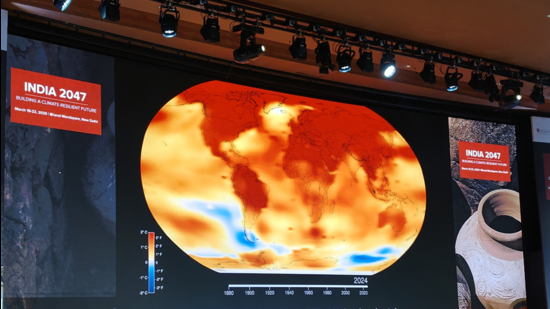India hasn’t warmed as quickly but likely to warm faster now: Harvard scientist
Union environment ministry is organising a conference at Harvard focussed on practical, scalable, and evidence-based solutions for India’s climate resilience vision of 2047
Temperature rise in India has been lower than in the world’s other parts as per the 40-year data from the US agency National Aeronautics and Space Administration (NASA) but this will change and India will have to adapt to higher rates of warming, a Harvard University climate scientist has said.

“The good news is that India has not warmed as quickly. ...it is expected to warm faster in the next 20 to 40 years,” said Harvard University’s Science, Technology, and Public Policy Program co-director Daniel P Schrag at the four-day “India 2047—Building A Climate Resilient Future” conference on Wednesday.
He said aerosols or pollution radiating heat back and massive irrigation in agricultural lands, which leads to an increase in soil moisture and evaporation, could be two explanations why warming may be slower in India.
Schrag, speaking on the topic “The Climate Challenge: What Lies Ahead?” said global warming could be as high as 3.5 to 4°C by the end of the century over pre-industrial levels. “Continents are warming faster than oceans. This is basic physics. Oceans take up heat, they are like giant air conditioners. The good news is that earth has not warmed as quickly because of oceans and the bad news is that there will be more warming,” said Schrag. “We have to prepare for something that nobody has ever seen...there will be a lot of difference between today and 2047.”
Minister of state for environment Kirti Vardhan Singh, who inaugurated the four-day conference at Harvard on Wednesday, said the gathering marks a defining moment in the collective pursuit of a sustainable tomorrow. He said it brings together some of the brightest minds in climate science, public health, labour, urban planning, and governance.
Singh said the conference, which the Union environment ministry is organising in partnership with the Lakshmi Mittal and Family South Asia Institute and the Salata Institute For Climate and Sustainability, is about action, developing practical, scalable, and evidence-based solutions for India’s climate resilience vision of 2047.
The conference began with a focus on the climate science of heat and water and understanding how rising temperatures and erratic monsoons threaten food security and rural livelihoods.
A session on health was expected to focus on extreme heat, climate-sensitive diseases, and the resilience of healthcare systems. “A session will highlight how soaring temperatures affect labour productivity, especially for those toiling in the open,” said Singh.
Another session on the built environment will focus on shaping cities that must protect, not endanger, their people.
The attendees of the conference, which is closed to the public, would provide recommendations to the Indian government for the National Adaptation Plan expected to be submitted in November around the time of the 2025 UN Climate Change Conference (COP30) in Brazil.
Tarun Khanna, a professor at the Harvard Business School, said India is producing science-based ventures related to climate mitigation and adaptation. “India can certainly lead on the adaptation methods, especially relevant to the Global South if we use our unique IndiaStack’s credentials and micropayment possibilities to multiply science’s possibilities.”
The agenda for the event said adaptation is not an option but imperative for a developing country like India, where climate-sensitive sectors like agriculture, fisheries, forestry, and water resources form the backbone of the economy. It underlined adaptation is about managing risks and integrating climate resilience into national policies, economic planning, and governance structures to ensure long-term sustainability.
The agenda noted integrating climate resilience requires a multi-pronged approach, combining scientific risk assessments, climate-resilient infrastructure, traditional knowledge and gender mainstreaming, financial protection mechanisms, and policy-driven strategies.
It highlighted adaptation efforts require a significant financial investment including mobilising blended finance models, private sector contributions, and international support.






